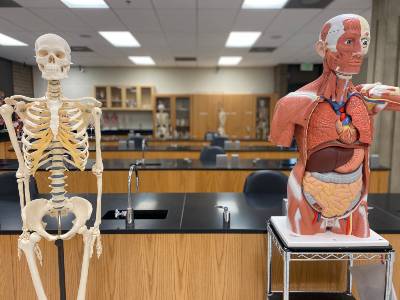About the Biology Department

"Being a part of the Biology department was a fantastic opportunity not only for the insight that I’ve gained, but mainly because of the professors that I’ve had the honor to meet and engage with."
Shewit N.- Seattle University, Nursing Student
Biology Faculty
Our biology department has four full-time faculty and several associate faculty with expertise in various biology fields: ecology, microbiology, cellular biology, nutrition, anatomy & physiology, and immunology. Many of our faculty hold doctorate degrees and are involved in research in their field and education research. Our faculty have also won awards for teaching, including awards from the Edmonds College Foundation:
- 2013 Echelbarger-Sherman Exceptional Faculty Award: Jenny McFarland, PhD
- 2021 Echelbarger-Sherman Exceptional Faculty Award: Jonathan Miller, PhD
- 2022 Echelbarger-Sherman Exceptional Faculty Award: Lori Hays, PhD
- 2025 ACT Faculty Award: Lori Hays, PhD
Biology Courses
The biology department offers a variety of courses: 5 for non-majors needing a science class and 12 for majors. Our department strives to offer various instruction modalities, including online, hybrid, and in-person classes, with the flexibility to fit our students' needs.
Majors Biology Courses
The Biology Department offers several classes for transfer students majoring in life science or health-related fields. The BIOL& 211, 212, and 213 sequences provide a college-level introduction to biology. This sequence prepares you for upper-division biology classes at universities and four-year colleges. You must have at least one quarter of college-level chemistry before or concurrently while enrolled in BIOL& 211. BIOL&212 and BIOL& 213 may be taken in any order after completion of BIOL& 211.
BIOL& 160 is the preferred prerequisite for BIOL& 241, 242, and 260 for pre-healthcare majors planning on transferring to Radiology, Nursing, Dental Hygiene, and other Allied Health programs. BIOL& 211 will also be accepted as a prerequisite for BIOL& 241, 242, and 260. Students needing to take the biology series (BIOL& 211, 212, 213) for pre-medicine, pre-dental, pre-pharmacy, or other graduate programs should take BIOL& 211 instead of BIOL& 160. BIOL& 160 will not substitute for BIOL& 211 for enrollment in the biology series. NUTR& 101 and BIOL& 160 requires only placement into MATH 87 and ENGL99.
- General Biology w/ lab (BIOL& 160) provides an introduction to biology, with an emphasis on evolution, diversity of life, cell structures and function, metabolism, molecular biology, and genetics. Designed for students pursuing nursing, dental hygiene, and related health professions. This 5-credit lab satisfies a natural science distribution course for many degree programs, including the Pre-nursing DTA.
- Majors Cellular w/ lab (BIOL& 211) provides a foundation of molecular and cellular biology, including cellular structure and metabolic pathways, macromolecules, genetics, evolution, and principles of the scientific method. This is a prerequisite course for all students continuing in both the pre-nursing and biology DTA pathways. This 5-credit lab satisfies a natural science distribution course for many degree programs, including the Biology and Pre-nursing DTA.
- Majors Animal w/ lab (BIOL&212) continues exploring evolutionary biology as it relates to animals and introduces students to different organisms. This class utilizes CURE (curricularized undergraduate research education) with our butterfly lab allowing students to research climate change effects on butterflies. This 5-credit lab satisfies a natural science distribution course for many degree programs including the Biology DTA (or as an elective on the Pre-nursing DTA).
- Majors Plant w/ lab (BIOL&213) introduces students to plant biology, including ecology and societal impacts. This class also utilizes CURE (curricularized undergraduate research education) with our butterfly lab allowing students to research climate change effects on butterflies. This 5-credit lab satisfies a natural science distribution course for many degree programs, including the Biology DTA (or as an elective on the Pre-nursing DTA).
- Human Anatomy & Physiology I w/ lab (BIOL& 241) introduces students to histology and the anatomy and physiology of the integumentary, skeletal, muscular, and nervous systems (including special senses) using a regional approach to learning anatomy of bones, muscles, and joints. This 5-credit lab satisfies a natural science distribution course for many degree programs, including the Pre-nursing DTA (or as an elective on the Biology DTA).
- Human Anatomy & Physiology II w/ lab (BIOL& 242) continues the exploration of the human body with the endocrine, cardiovascular, respiratory, lymphatic/immune, digestive, urinary, and reproductive system anatomy and physiology. This 5-credit lab satisfies a natural science distribution course for many degree programs, including the Pre-nursing DTA (or as an elective on the Biology DTA).
- Special Topics in Biology (BIOL 255) introduces students to current topics in biology. Topics vary each quarter and include ecology, microbiology, and human physiology concepts. This is a 1-credit course.
- Microbiology w/ lab (BIOL& 260) continues exploring cellular structures and exploring microscopic organisms' diversity. This class utilizes CURE (curricularized undergraduate research education) for students to examine microorganisms in different ecological niches. This 5-credit lab satisfies a natural science distribution course for many degree programs, including the Pre-nursing DTA (or as an elective on the Biology DTA).
- Undergraduate Research in Biology (BIOL& 293) allows students to engage in undergraduate research projects and the processes of scientific analysis and experimental design to explore biological questions. This 3-credit lab satisfies an elective distribution course for many degree programs, including the Pre-nursing DTA and Biology DTA).
- Nutrition (NUTR& 101) examines current nutrition science topics, including chemical composition of foods, metabolism, food safety, and applications of nutrition in health and disease. This class is also available for non-majors students as a science course. This 5-credit lab satisfies a natural science distribution course for many degree programs, including the Pre-nursing DTA (or as an elective on the Biology DTA).
Support Corequisite Courses
In addition to the majors level classes, we offer support corequisite courses for students to take along with some of the majors biology classes. These courses can supplement when an additional course credit is needed, such as with anatomy & physiology, and as additional opportunities for instructor support with terminology and concepts. These classes are graded as satisfactory/unsatisfactory and must be taken in the same quarter as the majors classes.
- Problem-solving for majors cellular biology (BIOL 210) is a corequisite class taken with BIOL& 211 that has supplemental material and instructor support to help students with the terminology and concepts in cellular biology. This is a 1-credit class graded as satisfactory/unsatisfactory, which meets the elective requirements for the Biology and Pre-nursing DTA when taken at the same time as BIOL& 211.
- Problem-solving for majors human anatomy & physiology I (BIOL 251) is a corequisite class taken with BIOL& 241 that has supplemental material and instructor support to help students with the terminology and concepts in anatomy & physiology. This is a 1-credit class graded as satisfactory/unsatisfactory, which meets the elective requirements for the Biology and Pre-nursing DTA when taken at the same time as BIOL& 241.
Non-Majors Biology Courses
Three biology classes will fulfill the science distribution (general education) requirements for the Associate of Arts degree with minimal prerequisites. These classes are intended primarily for transfer students who do not plan to major in science. These courses have two prerequisites (placement in Essentials of Intermediate Algebra (MATH 087) and Critical Reading/Writing (ENGL099)).
- Survey of Biology (BIOL& 100) introduces major biological principles and scientific processes. This 5-credit lab satisfies many natural science and mathematics distribution courses for various programs.
- Special Topics in Biology (BIOL 155) introduces students to current topics in biology. Topics vary each quarter and include ecology, microbiology, and human physiology concepts. This is a 1-credit class.
- Human Biology (BIOL& 175) introduces human biology, the diversity human populations, and human health and disease. This 5-credit lab satisfies many natural science and mathematics distribution courses for various programs.
- Western Washington Ecology (BIOL 105) offers the opportunity to study terrestrial organisms and ecosystems common to the Puget Sound lowlands and the west slopes of the Cascade mountains. This 5-credit lab satisfies many natural science and mathematics distribution courses for various programs.
- Marine Biology (BIOL 106) emphasizes the sea life of intertidal Puget Sound and provides field trips to regional beaches. This 5-credit lab satisfies many natural science and mathematics distribution courses for various programs.
Biology Classrooms

Our classrooms are well-equipped laboratories and student study areas. Science lecture rooms have computers with web access, projection systems, and other standard audio-visual equipment. In addition to models, slides, skeletons, and other traditional laboratory materials, students use DNA and protein electrophoresis, PCR, and other biotechnology equipment in our laboratories. We also have a butterfly research lab that explores the impacts of climate change using a butterfly model system.

